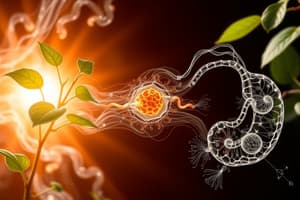Podcast
Questions and Answers
What are the reactants of photosynthesis?
What are the reactants of photosynthesis?
- Carbon dioxide and water (correct)
- Oxygen and glucose
- Carbon monoxide and nitrogen
- Glucose and oxygen
Which of the following is a product of photosynthesis?
Which of the following is a product of photosynthesis?
- Carbon dioxide
- Nitrogen
- Glucose (correct)
- Water
What serves as the reactants of cellular respiration?
What serves as the reactants of cellular respiration?
- Carbon dioxide and water
- Water and oxygen
- Nitrogen and carbon dioxide
- Oxygen and glucose (correct)
What are the products of cellular respiration?
What are the products of cellular respiration?
Which substance is a waste product of photosynthesis?
Which substance is a waste product of photosynthesis?
What is a function of water produced in cellular respiration?
What is a function of water produced in cellular respiration?
Study Notes
Photosynthesis and Cellular Respiration
Reactants of Photosynthesis
Photosynthesis is the process by which plants, algae, and some bacteria convert light energy from the sun into chemical energy in the form of glucose and oxygen. The reactants of photosynthesis are carbon dioxide (CO2) and water (H2O). Carbon dioxide is absorbed from the air through small openings in the leaves called stomata. Water is absorbed from the soil by the plant's roots and transported to the leaves through the xylem.
Products of Photosynthesis
The products of photosynthesis are glucose (C6H12O6) and oxygen (O2). Glucose is a type of sugar that plants use as a source of energy and as a building block for other organic compounds. Oxygen is released into the atmosphere as a waste product.
Reactants of Cellular Respiration
Cellular respiration is the process by which organisms break down glucose and other organic molecules to release energy in the form of ATP. The reactants of cellular respiration are glucose (C6H12O6) and oxygen (O2). Glucose is obtained from the breakdown of other organic molecules, such as glycogen and starch, while oxygen is obtained from the air through the lungs or gills.
Products of Cellular Respiration
The products of cellular respiration are carbon dioxide (CO2) and water (H2O). Carbon dioxide is released into the atmosphere as a waste product, while water is used by the body for various functions, such as maintaining body temperature and lubricating joints.
Relationship between Photosynthesis and Cellular Respiration
Photosynthesis and cellular respiration are interconnected processes. Photosynthesis is an anabolic process that converts carbon dioxide and water into glucose and oxygen. Cellular respiration is a catabolic process that breaks down glucose and other organic molecules to release energy in the form of ATP. The products of one process are used as reactants in the other process. Carbon dioxide produced by cellular respiration is used by plants in photosynthesis, while oxygen produced by photosynthesis is used by organisms, including plants, for cellular respiration.
Studying That Suits You
Use AI to generate personalized quizzes and flashcards to suit your learning preferences.
Description
Learn about the reactants and products of photosynthesis and cellular respiration processes, and understand the relationship between the two essential biological processes.




